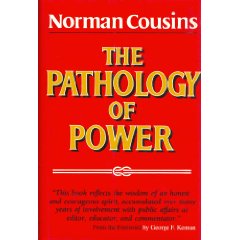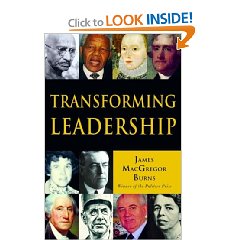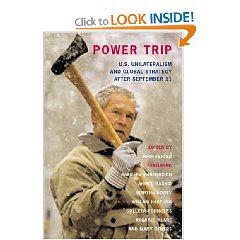This book richly merits republication, and it is fortunate that so many copies are still available. Consider the author's opening statement:
“Connected to the tendency of power to corrupt are yet other tendencies that emerge from the pages of the historians:
* The tendency of power to drive intelligence underground;
* The tendency of power to become a theology, admitting no other gods before it;
* The tendency of power to distort and damage the traditions and institutions it was designed to protect;
* The tendency of power to create a language of its own, making other forms of communication incoherent and irrelevant;
* The tendency of power to spawn imitators, leading to volatile competition;
* The tendency of power to set the stage for its own use.
This is simply a brilliant, reasoned, well-documented and well-structured look at the greatest threat to any Republic's national security and prosperity: absolute power with its attendant absolute corruption. All that the author has to say over his 13 chapters, from why Hiroshima to the reality of General MacArther to General and President Eisenhower's prophetic emphasis on “true” security rather than the “cooked books” false security of the military-industrial complex, every bit of this is directly applicable to the national security challenges–and the internal ethical challenges–facing the American people are their largely corrupt national political system at the dawn of the 21st Century. Of course it applies to all other nations as well, but as the Americans are the largest bull, they do the most damage to themselves as well as to others.
The author concludes with some “first principles” that are alone worth the price of the book, these are abbreviated here:
* security of the human commonwealth above security of the state
* well-being of mankind above well-being of any one nation
* needs of future generations above the needs of current generation.
* rights of man over the rights of the state
* private conscience over public edict
* ordeal of peace over easy drift of prosperity
His final sentence will not be understood by those who “do not do nuances.” He says: “The challenge, therefore, is to recognize that national security depends on a wide range of factors, some of them nonmilitary in nature.” He goes on to list the freedoms and well-being of the society itself, the focus on making human development the highest national security priority; the selection of creative transformative rather than manipulative leaders; the articulation of national goals that win foreign support on their merits; the strengthening of international institutions; and finally, the recognition that governance must be focused on the common good, not on retaining power. To lead properly is to be free of corruption. Anything else is pathological and undermines national security.
More recent books expanding on this theme, with reviews:
Vice: Dick Cheney and the Hijacking of the American Presidency
Running on Empty: How the Democratic and Republican Parties Are Bankrupting Our Future and What Americans Can Do About It
The Battle for the Soul of Capitalism: How the Financial System Underminded Social Ideals, Damaged Trust in the Markets, Robbed Investors of Trillions – and What to Do About It
Weapons of Mass Deception: The Uses of Propaganda in Bush's War on Iraq
Blood Money: Wasted Billions, Lost Lives, and Corporate Greed in Iraq
Sleeping with the Devil: How Washington Sold Our Soul for Saudi Crude
Conspiracy of Fools: A True Story
The Informant: A True Story
Legacy of Ashes: The History of the CIA
9/11 Synthetic Terror: Made in USA, Fourth Edition












